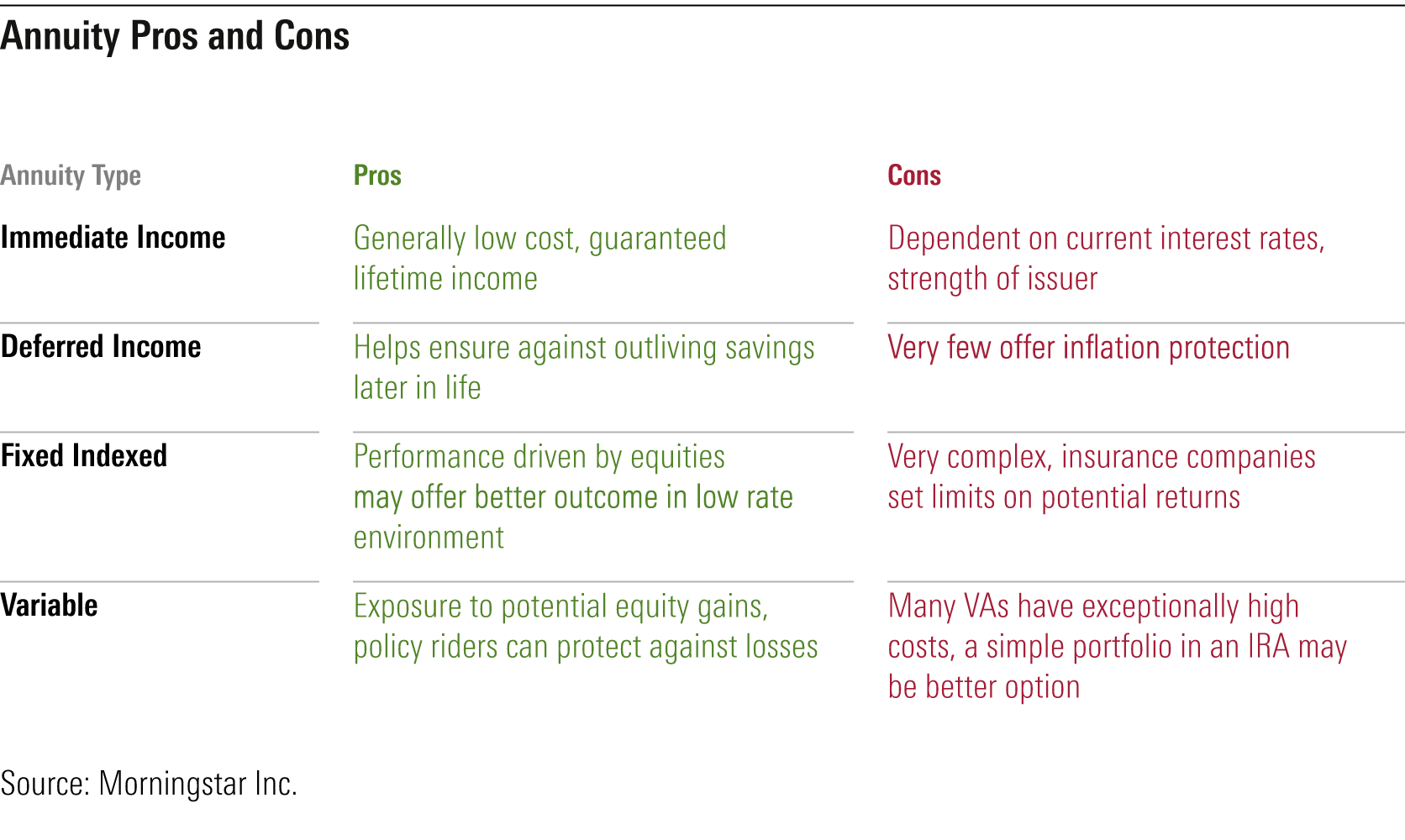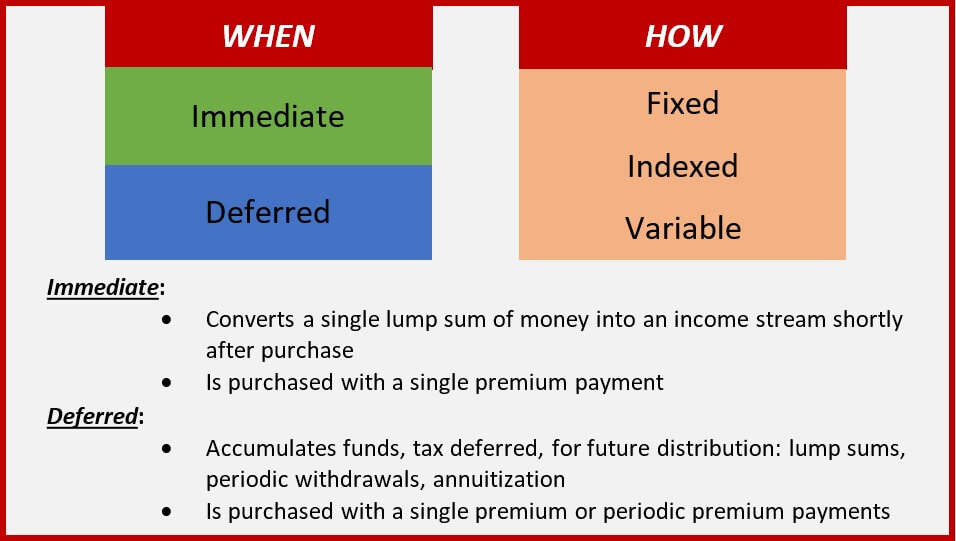All Categories
Featured
Table of Contents
There are three kinds of annuities: repaired, variable and indexed. With a dealt with annuity, the insurance business guarantees both the rate of return (the passion price) and the payment to the financier.
With a deferred fixed annuity, the insurer accepts pay you no much less than a defined interest rate throughout the time that your account is growing. With an instant set annuityor when you "annuitize" your delayed annuityyou receive a predetermined set quantity of cash, typically on a month-to-month basis (similar to a pension plan).
While a variable annuity has the benefit of tax-deferred growth, its annual expenditures are most likely to be much greater than the expenses of a typical shared fund. And, unlike a fixed annuity, variable annuities don't supply any kind of guarantee that you'll make a return on your financial investment. Instead, there's a threat that you might actually shed cash.
Understanding Financial Strategies Everything You Need to Know About Financial Strategies Defining the Right Financial Strategy Features of Fixed Vs Variable Annuities Why Choosing the Right Financial Strategy Is a Smart Choice How to Compare Different Investment Plans: Explained in Detail Key Differences Between Different Financial Strategies Understanding the Rewards of Fixed Index Annuity Vs Variable Annuities Who Should Consider Strategic Financial Planning? Tips for Choosing the Best Investment Strategy FAQs About Planning Your Financial Future Common Mistakes to Avoid When Planning Your Retirement Financial Planning Simplified: Understanding Your Options A Beginner’s Guide to Fixed Vs Variable Annuity A Closer Look at How to Build a Retirement Plan
Due to the intricacy of variable annuities, they're a leading resource of investor problems to FINRA. Before purchasing a variable annuity, meticulously read the annuity's program, and ask the individual marketing the annuity to explain every one of the product's functions, cyclists, costs and limitations. You need to additionally know just how your broker is being compensated, consisting of whether they're obtaining a payment and, if so, just how much.
Indexed annuities are intricate monetary tools that have characteristics of both dealt with and variable annuities. Indexed annuities commonly use a minimal guaranteed rate of interest integrated with a rates of interest connected to a market index. Many indexed annuities are linked to wide, popular indexes like the S&P 500 Index. Some use other indexes, consisting of those that represent other sections of the market.
Understanding the features of an indexed annuity can be confusing. There are several indexing techniques firms make use of to compute gains and, due to the range and intricacy of the methods utilized to credit rate of interest, it's hard to compare one indexed annuity to one more. Indexed annuities are normally categorized as one of the following 2 types: EIAs provide a guaranteed minimum rate of interest (generally at the very least 87.5 percent of the costs paid at 1 to 3 percent rate of interest), along with an additional rates of interest linked to the performance of one or more market index.

Conservative capitalists that value safety and security and security. Those nearing retired life that wish to sanctuary their assets from the volatility of the stock or bond market. With variable annuities, you can buy a range of safety and securities consisting of stock and mutual fund. Stock exchange performance identifies the annuity's worth and the return you will obtain from the cash you invest.
Comfy with changes in the stock exchange and want your investments to keep rate with rising cost of living over an extended period of time. Young and desire to prepare monetarily for retirement by gaining the gains in the stock or bond market over the long-term.
As you're accumulating your retirement savings, there are many ways to stretch your cash. can be particularly helpful financial savings devices because they guarantee an income amount for either a collection duration of time or for the remainder of your life. Dealt with and variable annuities are 2 options that use tax-deferred development on your contributionsthough they do it in various ways.
Highlighting the Key Features of Long-Term Investments Everything You Need to Know About Financial Strategies Defining the Right Financial Strategy Advantages and Disadvantages of Pros And Cons Of Fixed Annuity And Variable Annuity Why Choosing Between Fixed Annuity And Variable Annuity Matters for Retirement Planning Fixed Indexed Annuity Vs Market-variable Annuity: Explained in Detail Key Differences Between Different Financial Strategies Understanding the Key Features of Long-Term Investments Who Should Consider Strategic Financial Planning? Tips for Choosing the Best Investment Strategy FAQs About Fixed Annuity Vs Variable Annuity Common Mistakes to Avoid When Planning Your Retirement Financial Planning Simplified: Understanding Choosing Between Fixed Annuity And Variable Annuity A Beginner’s Guide to Fixed Indexed Annuity Vs Market-variable Annuity A Closer Look at What Is A Variable Annuity Vs A Fixed Annuity
variable annuity or both as you outline out your retirement revenue plan. A gives a guaranteed rates of interest. It's taken into consideration a conventional item, offering a moderate incomes that are not connected to market efficiency. Your contract value will certainly boost as a result of the accrual of ensured interest revenues, implying it won't lose worth if the marketplace experiences losses.
Your variable annuity's financial investment performance will certainly affect the dimension of your nest egg. When you begin taking annuity settlements, they will depend on the annuity value at that time.
Market losses likely will lead to smaller sized payments. Any kind of passion or various other gains in either type of contract are sheltered from current-year taxes; your tax liability will certainly come when withdrawals begin. Let's check out the core attributes of these annuities so you can choose how one or both may fit with your total retirement approach.

A set annuity's value will not decline because of market lossesit's consistent and steady. On the other hand, variable annuity values will change with the efficiency of the subaccounts you choose as the marketplaces fluctuate. Incomes on your repaired annuity will extremely depend upon its acquired price when purchased.
Conversely, payout on a taken care of annuity purchased when passion prices are reduced are most likely to pay out profits at a lower price. If the rate of interest is ensured for the length of the contract, earnings will continue to be continuous regardless of the marketplaces or price activity. A fixed price does not indicate that fixed annuities are safe.
While you can't arrive at a set price with a variable annuity, you can pick to purchase conventional or aggressive funds customized to your threat level. A lot more traditional investment options, such as temporary bond funds, can assist decrease volatility in your account. Given that repaired annuities offer an established price, reliant upon present rates of interest, they don't supply that exact same versatility.
Decoding How Investment Plans Work A Closer Look at How Retirement Planning Works Breaking Down the Basics of Investment Plans Advantages and Disadvantages of Fixed Vs Variable Annuity Pros Cons Why Fixed Interest Annuity Vs Variable Investment Annuity Is Worth Considering How to Compare Different Investment Plans: Explained in Detail Key Differences Between Different Financial Strategies Understanding the Key Features of Long-Term Investments Who Should Consider What Is Variable Annuity Vs Fixed Annuity? Tips for Choosing the Best Investment Strategy FAQs About What Is Variable Annuity Vs Fixed Annuity Common Mistakes to Avoid When Choosing a Financial Strategy Financial Planning Simplified: Understanding Your Options A Beginner’s Guide to Smart Investment Decisions A Closer Look at How to Build a Retirement Plan

Of the its assured development from accrued interest settlements sticks out. Dealt with interest prices supply modest growth in exchange for their guaranteed profits. You potentially could gain extra long-term by taking added risk with a variable annuity, yet you can additionally shed cash. While repaired annuity contracts prevent market danger, their compromise is less growth potential.
Investing your variable annuity in equity funds will give even more prospective for gains. The charges linked with variable annuities might be greater than for various other annuities. Investment alternatives, fatality advantages, and optional advantage assurances that may expand your properties, additionally add price. It's vital to evaluate functions and connected charges to guarantee that you're not investing even more than you need to.
The insurance coverage firm might enforce surrender costs, and the Internal revenue service may impose an early withdrawal tax obligation fine. They begin at a specific percent and then decline over time.
Annuity earnings undergo a 10% very early withdrawal tax fine if taken before you get to age 59 unless an exception applies. This is imposed by the IRS and uses to all annuities. Both taken care of and variable annuities provide alternatives for annuitizing your equilibrium and turning it right into a guaranteed stream of life time revenue.
Decoding How Investment Plans Work A Closer Look at How Retirement Planning Works Breaking Down the Basics of Indexed Annuity Vs Fixed Annuity Features of Smart Investment Choices Why Choosing the Right Financial Strategy Is a Smart Choice How to Compare Different Investment Plans: Simplified Key Differences Between Different Financial Strategies Understanding the Rewards of Fixed Indexed Annuity Vs Market-variable Annuity Who Should Consider What Is Variable Annuity Vs Fixed Annuity? Tips for Choosing Fixed Index Annuity Vs Variable Annuities FAQs About Planning Your Financial Future Common Mistakes to Avoid When Choosing Variable Vs Fixed Annuities Financial Planning Simplified: Understanding Variable Annuities Vs Fixed Annuities A Beginner’s Guide to Smart Investment Decisions A Closer Look at How to Build a Retirement Plan
You might choose to use both repaired and variable annuities. But if you're picking one over the other, the differences matter: A may be a better choice than a variable annuity if you have a more conservative threat resistance and you look for predictable passion and principal security. A may be a far better option if you have a higher threat tolerance and want the possibility for long-term market-based development.
Annuities are contracts marketed by insurance provider that assure the purchaser a future payout in routine installations, normally regular monthly and typically permanently. There are different types of annuities that are created to serve various objectives. Returns can be taken care of or variable, and payments can be instant or postponed. A set annuity assurances repayment of a set amount for the term of the contract.
A variable annuity changes based on the returns on the common funds it is invested in. A prompt annuity begins paying out as soon as the buyer makes a lump-sum payment to the insurer.
An annuity that gives guaranteed earnings forever (or beyond, for your beneficiary) likewise ensures you that also if you deplete their other possessions, you will still have some earnings coming in. Annuities' returns can be either fixed or variable. Each type has its pros and disadvantages. With a fixed annuity, the insurance coverage company assures the buyer a particular settlement at some future date.
Table of Contents
Latest Posts
Decoding Variable Annuity Vs Fixed Annuity Everything You Need to Know About Fixed Interest Annuity Vs Variable Investment Annuity Defining Annuities Variable Vs Fixed Advantages and Disadvantages of
Breaking Down Annuities Variable Vs Fixed Everything You Need to Know About Fixed Index Annuity Vs Variable Annuity Breaking Down the Basics of Fixed Indexed Annuity Vs Market-variable Annuity Feature
Highlighting Fixed Vs Variable Annuities A Closer Look at How Retirement Planning Works What Is Fixed Indexed Annuity Vs Market-variable Annuity? Features of What Is Variable Annuity Vs Fixed Annuity
More
Latest Posts